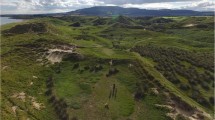Abstract
For fast and convenient access to the environment based on the geomorphic characteristics of camouflage regional model for the complexity of topography, this article analyzes a variety of terrain modeling method’s advantages and limitations, discussed a variety of modeling methods in the set up of the study of basic on the hybrid modeling method and the integrated use of research results to generate the details of the existing landform characteristics can be controlled on all-terrain results. Generate local terrain adaptive modeling method, as a regional model disguised form with the local terrain topography of the region to adapt to a good camouflage effect.
Preview
Unable to display preview. Download preview PDF.
Similar content being viewed by others
References
She, L.H.: FBM-based Fractal Terrain Simulation Principle Study. Aviation Journal (1999)
Kang, X.Q.: MPD-based Method of Study of Mountain Terrain Generation. Northwestern Polytechnical University Master’s degree thesis (2005)
Qin, X.Y., Bu, B.: Based on Fractal Theory of Micro-topography Reconstruction. National University of Defense Technology Journal 25(5) (2003)
Xu, D., Jin, B.: Scattered Points Based on Grid-based Topographic Maps Controllable Technology [J]. Journal of Engineering Graphics 26(4), 119–123 (2005)
Falconer, K.: Fractal Geometry-mathematical Foundations and Applications. John Wiley &Sons, New York (1990)
Author information
Authors and Affiliations
Editor information
Editors and Affiliations
Rights and permissions
Copyright information
© 2009 Springer-Verlag Berlin Heidelberg
About this paper
Cite this paper
Zhao, M., Deng, S., Shi, Z. (2009). Research of the Method of Local Topography Rapid Reconstructed. In: Huang, DS., Jo, KH., Lee, HH., Kang, HJ., Bevilacqua, V. (eds) Emerging Intelligent Computing Technology and Applications. With Aspects of Artificial Intelligence. ICIC 2009. Lecture Notes in Computer Science(), vol 5755. Springer, Berlin, Heidelberg. https://doi.org/10.1007/978-3-642-04020-7_54
Download citation
DOI: https://doi.org/10.1007/978-3-642-04020-7_54
Publisher Name: Springer, Berlin, Heidelberg
Print ISBN: 978-3-642-04019-1
Online ISBN: 978-3-642-04020-7
eBook Packages: Computer ScienceComputer Science (R0)




